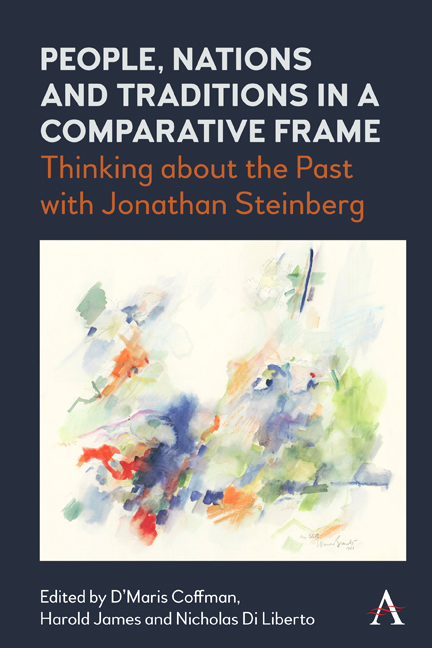 People, Nations and Traditions in a Comparative Frame
People, Nations and Traditions in a Comparative Frame Book contents
- Frontmatter
- Contents
- Foreword
- Acknowledgements
- Notes on Contributors
- Introduction
- Part One Methodological Pluralism and New Applications
- Part Two Personal and National Character
- Part Three Society, Families and the Sovereign Self
- Part Four History Out of Sync: Modernity and Tradition
- Part Five History, Narrative and the Human Condition
- Afterword
- Bibliography of Jonathan Steinberg’s Works
- Index
Introduction
Published online by Cambridge University Press: 23 February 2022
- Frontmatter
- Contents
- Foreword
- Acknowledgements
- Notes on Contributors
- Introduction
- Part One Methodological Pluralism and New Applications
- Part Two Personal and National Character
- Part Three Society, Families and the Sovereign Self
- Part Four History Out of Sync: Modernity and Tradition
- Part Five History, Narrative and the Human Condition
- Afterword
- Bibliography of Jonathan Steinberg’s Works
- Index
Summary
The diverse essays in this volume reflect Jonathan Steinberg's methodological pluralism and insatiable curiosity for historical questions which cross disciplinary and geographical boundaries. Animating students, colleagues, friends and wider audiences with his enthusiasm for ‘thinking about the past’ was his vocation, one that he pursued with unmatched enthusiasm. Through this collection, we hope to convey something of the intellectual range, analytical purchase and moral purpose of his historical writing and teaching.
One feature of Jonathan's inspiring and charismatic lectures was his unique ability to combine an analysis – always fresh, never pre-cooked – of big historical structures and trends with an acute awareness of the importance of individual personalities. His interest in structural analysis is reflected in all of his written work, in Yesterday's Deterrent and in Why Switzerland? and, probably most strikingly and rigorously, in the comparison of German and Italian wartime mentalities in All or Nothing. The culmination of his deep probing into the human psyche that occurred in all of the undergraduate and general lectures came late in his career in powerful form in the masterful biography, Bismarck. What made that book so insightful was the fresh portrait he painted of how the monarch, King and later Kaiser Wilhelm, was a substitute father to the German politician and how the political relationship which moulded the constitution of Imperial Germany was the outcome of the family dynamics in the upbringing of future ‘Iron Chancellor’ – the distant father and the emotional mother. In developing this analysis, Jonathan went far beyond other biographers, even beyond Otto Pflanze, who spent his life writing and then rewriting his Bismarck biography after taking a turn from diplomatic history to psychoanalysis.
There are other features that deserve emphasis. There was a concern for structure, but also an awareness of the importance of chance. Jonathan was also amusing about this, and looked for illustrations in his own biography: he liked to tell the wonderful story of how he became interested in Germany, as if it were not obvious that the son of a famous rabbi should be interested in the cultural and political origins of the greatest crime of the twentieth century. After he trained as a medical orderly to deal with shell shock, or post-traumatic distress, his personnel file apparently had slid behind a radiator so that he was not sent to Korea.
- Type
- Chapter
- Information
- People, Nations and Traditions in a Comparative FrameThinking about the Past with Jonathan Steinberg, pp. 1 - 8Publisher: Anthem PressPrint publication year: 2021
